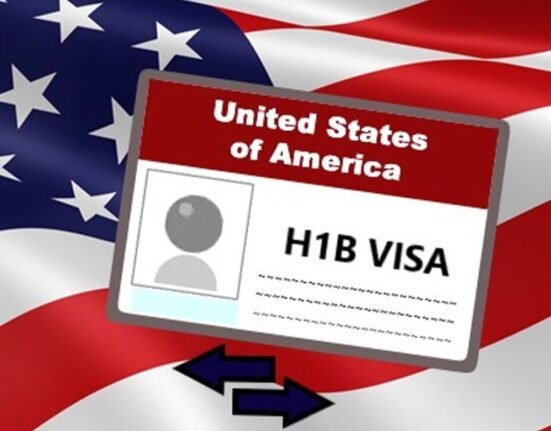In an unexpected and significant development that could change the landscape for many immigrant workers in the U.S., a group of lawmakers has introduced a resolution to repeal the Biden-era rule that extended automatic work permit renewals from 180 days to a potentially life-altering 540 days. The resolution, if passed, could profoundly impact immigrant workers, including those applying for green cards, refugees, and spouses of H-1B visa holders, who depend on the extended work permit period to maintain financial stability and continue contributing to the workforce. This news comes as the U.S. immigration system already grapples with a backlog of cases, raising concerns for individuals and families affected by this proposed change.
The 540-Day Extension: A Lifeline for Immigrant Workers
The 540-day extension was introduced by the Department of Homeland Security (DHS) in December 2024, and it went into effect in January 2025. This measure aimed to address the growing delays in processing work permit renewals, providing relief to non-citizens who had already been living and working in the U.S. but faced uncertainty as their work permits expired while waiting for renewals. For immigrants, the extended renewal period was seen as a much-needed safeguard against the potential loss of their jobs and the ability to support their families.
However, this policy shift has now come under threat. Lawmakers pushing for the repeal argue that the extension exacerbates existing issues in the immigration system and prolongs the wait for work permit approvals, which they claim leads to inefficiencies. If successful, this repeal would likely worsen the already complex and often overwhelming process immigrants face when trying to renew their permits. The stakes are high for the families who depend on this lifeline to stay financially secure while awaiting the resolution of their immigration status.
The Fallout for Immigrant Workers and Their Families
One of the most vulnerable groups in this debate is the spouses of H-1B and L-1 visa holders. These workers, often professionals in sectors like technology, healthcare, and engineering, rely on the extended work permits to maintain their jobs and financial independence. For H-4 visa holders—spouses of H-1B visa holders seeking a green card—the 540-day extension provided a crucial buffer during the renewal process, allowing them to continue working without the threat of job loss.
The repeal of this rule would immediately affect these workers. If their work permits expire before a renewal is processed, they would no longer be authorized to work, which could create serious financial instability for families already dealing with the complexities of the immigration process. Losing the ability to work could also mean the loss of health insurance, social security benefits, and other critical support systems, leading to further hardship for families who have already faced significant delays and uncertainty.
The L-2 visa holders, spouses of L-1 visa holders, would also be at risk under the proposed repeal. These individuals, many of whom have established careers in the U.S., would no longer have an automatic right to work while waiting for permit renewals. Such changes not only threaten the economic security of these families but could also drive them out of the job market entirely, leaving them to navigate an increasingly difficult and unstable system.
Labor Shortages and Impact on Critical U.S. Sectors
The broader implications of this proposed repeal extend well beyond the individual families affected. The H-1B visa program, which allows U.S. employers to hire skilled foreign workers, remains vital for filling gaps in sectors with a critical need for talent—particularly technology, engineering, and healthcare. Many U.S. companies have come to rely on the H-1B program to hire professionals in these fields, where there is often a shortage of qualified domestic workers.
If the 540-day extension is repealed, many of these skilled foreign workers could be forced out of the job market, exacerbating labor shortages in key industries. This could have a ripple effect on the economy, as companies struggle to fill vacant positions and maintain productivity. For industries that rely heavily on foreign talent—such as tech, healthcare, and engineering—losing access to skilled workers could hurt innovation, reduce competitiveness, and hinder overall growth. Employers who are already grappling with the complexities of managing a workforce during an immigration backlog may be left scrambling to fill critical roles.
The Strain on the U.S. Immigration System
The U.S. immigration system is already in a state of disarray, with an estimated backlog of over 1.8 million employment-based green card applications. This delay has created significant stress for immigrants waiting to adjust their status or renew work permits. By repealing the 540-day extension, lawmakers could make an already broken system even worse, further extending the waiting period and increasing the strain on an overstretched bureaucracy.
The backlog is already causing significant employment gaps as immigrants struggle to maintain jobs while waiting for renewal approvals. Employers find themselves unable to plan for long-term staffing needs, while workers are left in a state of limbo, unsure of whether they can continue working or supporting their families. Repealing the rule would add further uncertainty to an already unstable situation, forcing many immigrants out of the workforce entirely or compelling them to accept lower-paying, less stable jobs while they await their permit renewals.
Economic Consequences and Increased Financial Hardship
The economic consequences of repealing the 540-day work permit extension are profound. Immigrant workers who lose their ability to work could find themselves without a source of income, potentially leading to severe financial hardship. This would be especially devastating for families who depend on two incomes to cover daily expenses such as rent, utilities, transportation, and healthcare.
For many families, the financial impact would be immediate and devastating. Those already living paycheck to paycheck could find themselves unable to meet basic needs, while others may have to resort to taking loans or borrowing from friends and family to make ends meet. This financial insecurity would add an additional layer of stress to an already challenging situation and could have long-lasting effects on the well-being of immigrant families.
Conclusion: The Need for Action and Awareness
As this issue continues to unfold, the stakes could not be higher. The future of thousands of immigrant workers, their families, and the broader U.S. economy hangs in the balance. It is crucial for those affected to stay informed about the progress of this repeal and the potential implications it may have on their lives and livelihoods.
For those seeking to stay up to date on developments in immigration, career opportunities, and the impact of policy changes, it is essential to remain connected to reliable sources of information. By joining our community, you will receive real-time updates and expert insights on not only immigration news but also the latest on energy, construction, engineering, and cryptocurrency. Don’t miss out on the opportunity to stay ahead of these critical developments. Join us on WhatsApp or Telegram for continuous updates and connect with others in the community. You can also send reports and articles to report@epci.ng or follow us on social media platforms such as X (Twitter), Instagram, LinkedIn, and Facebook for real-time industry news and insights.







Leave feedback about this